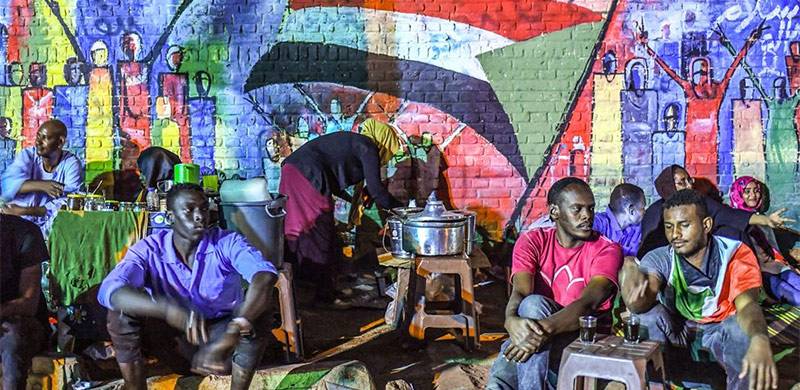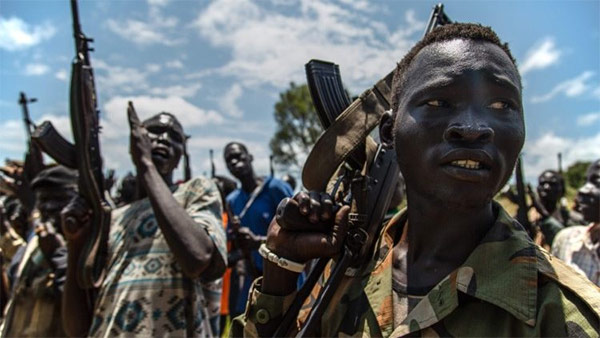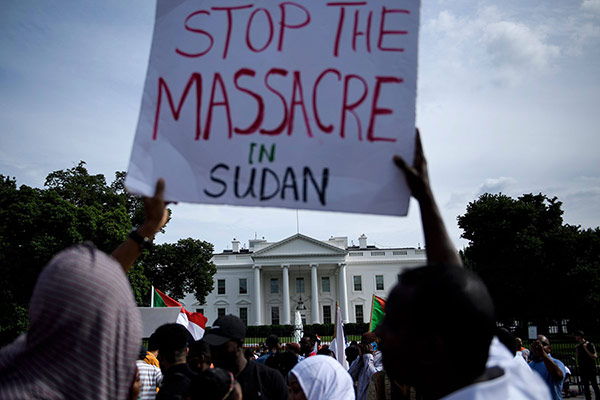
For the past three days, various Instagram users turned their display pictures to a blank blue color. This action is indicative of solidarity with the people of Sudan, who are undergoing a brutal civil war against the oppressive Transitional Military Council (TMC). The movement started after the death of a 26-year old mechanical engineer, Hashim Mattar, and now symbolises all the suffering Sudanese people. The ‘Sudanese Revolution’ – as it is being referred to – is a vile set of atrocities involving three militant groups, including the TMC, which has continuously been orchestrating violence against the local population.
Human Rights Watch has reported hundreds of deaths resulting from the massacre and sexual violence perpetrated by members of the military government. Worse still, the rebel forces have imposed an internet blackout, banning social media outlets, to prevent news of their atrocities from grasping the attention of the international community.

This violence takes origin from the events of December 2018, when the Sudanese people demonstrated peacefully in response to President Bashir’s austerity measures implemented at the cost of their living standards. This was coupled with the economic devastation brought about by the devaluation of their local currency.
Demonstrations were held by the Sudanese Professionals Association (SPA) which comprised of doctors, lawyers and health workers. These protests were violently suppressed by the military government and were responded to with mass arrests, sexual and gun violence, with the dumping of dead bodies in River Nile as a consequence.
These individuals were concerned about the actions of the military government after they had staged a coup to overthrow their ex-President, Omar Bashir.
Currently, there is a three-month state of emergency in place and a two-year transition period in preparation for civilian rule – meaning that the government will continue to commit human rights violations for the next two years, at the very least.

The government forces in Darfur are controlled by the head of the TMC, Gen Mohamed Hamdan “Hemeti” Dagalo, who was responsible for the deaths of over 300,000 people. Additionally, the government has a paramilitary force that consists of militiamen belonging to the Janjaweed – an infamous militia group in Sudan used to fight rebel groups on behalf of the army and a historically known source of violence in the region. The group is collectively called the ‘Rapid Support Forces’ (RSF) and are quick to act violently upon receiving command.
On the 3rd of June, the bloodshed reached its peak when a military crackdown took place in the capital city of Khartoum, killing over 150 people and injuring nearly a hundred. The massacre broke out after the Transitional Military Council suspended the agreements reached with a civil society organisation known as ‘Forces of Freedom and Change’ (FFC) in order to speed up the preparations for democratic elections due to take place in nine months.
The international community has responded to these events in a lethargic manner, not showing any intention of taking action. Most African and western countries have backed the protesters. In a joint statement, the United States (US), United Kingdom (UK), Canada and Norway condemned the actions of the Sudanese government.

As a measure of solidarity, the US removed Sudan from President Trump’s list of countries targeted by the “Muslim Ban.” Saudi Arabia, on the other hand, has urged discussions between the two sides but never openly condemned the atrocities being committed by the military.
However, humans all over the world continue to make donations and spread awareness about the cause of Sudan on the internet, making the issue hard to ignore for the world leaders.
Human Rights Watch has reported hundreds of deaths resulting from the massacre and sexual violence perpetrated by members of the military government. Worse still, the rebel forces have imposed an internet blackout, banning social media outlets, to prevent news of their atrocities from grasping the attention of the international community.

This violence takes origin from the events of December 2018, when the Sudanese people demonstrated peacefully in response to President Bashir’s austerity measures implemented at the cost of their living standards. This was coupled with the economic devastation brought about by the devaluation of their local currency.
Demonstrations were held by the Sudanese Professionals Association (SPA) which comprised of doctors, lawyers and health workers. These protests were violently suppressed by the military government and were responded to with mass arrests, sexual and gun violence, with the dumping of dead bodies in River Nile as a consequence.
These individuals were concerned about the actions of the military government after they had staged a coup to overthrow their ex-President, Omar Bashir.
Currently, there is a three-month state of emergency in place and a two-year transition period in preparation for civilian rule – meaning that the government will continue to commit human rights violations for the next two years, at the very least.

The government forces in Darfur are controlled by the head of the TMC, Gen Mohamed Hamdan “Hemeti” Dagalo, who was responsible for the deaths of over 300,000 people. Additionally, the government has a paramilitary force that consists of militiamen belonging to the Janjaweed – an infamous militia group in Sudan used to fight rebel groups on behalf of the army and a historically known source of violence in the region. The group is collectively called the ‘Rapid Support Forces’ (RSF) and are quick to act violently upon receiving command.
On the 3rd of June, the bloodshed reached its peak when a military crackdown took place in the capital city of Khartoum, killing over 150 people and injuring nearly a hundred. The massacre broke out after the Transitional Military Council suspended the agreements reached with a civil society organisation known as ‘Forces of Freedom and Change’ (FFC) in order to speed up the preparations for democratic elections due to take place in nine months.
The international community has responded to these events in a lethargic manner, not showing any intention of taking action. Most African and western countries have backed the protesters. In a joint statement, the United States (US), United Kingdom (UK), Canada and Norway condemned the actions of the Sudanese government.

As a measure of solidarity, the US removed Sudan from President Trump’s list of countries targeted by the “Muslim Ban.” Saudi Arabia, on the other hand, has urged discussions between the two sides but never openly condemned the atrocities being committed by the military.
However, humans all over the world continue to make donations and spread awareness about the cause of Sudan on the internet, making the issue hard to ignore for the world leaders.
